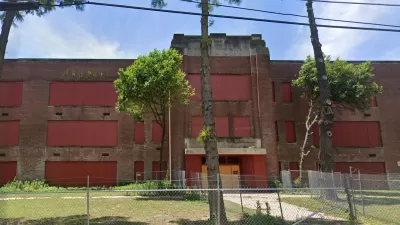One of the America's most unhealthy, auto-centric cities has seen the light - the handlebar headlight that is - with a push to improve its bicycling infrastructure as a means of economic development.
The public shaming of Memphis as one of the worst cities in America for cyclists wasn't enough to jolt the city into action, but rather it was the political will of a new Mayor who spied an opportunity for economic development, improving public health, and increasing community bonds and environmental stewardship. At the urging of Mayor A. C. Wharton Jr., and with funding from stimulus money and other federal sources, Memphis has increased its share of bike lanes from a mile and a half in 2008 to 160 miles (50 of which are dedicated to bikes) today, reports Bobby Allyn.
"City planners are using bike lanes as an economic development tool, setting the stage for new stores and enhanced urban vibrancy, said Kyle Wagenschutz, the city’s bike-pedestrian coordinator, a position the mayor created."
“The cycling advocates have been vocal the past 10 years, but nothing ever happened,” Mr. Wagenschutz said. “It took a change of political will to catalyze the movement.”
But the investment of political and financial capital in increasing the city's bike-friendliness hasn't appealed to everyone. According to Allyn, merchants have clashed with bike advocates over proposals for new lanes.
"Tensions aside, the mayor’s office says that the potential economic ripple effect of bike lanes is proof that they are a sound investment."
FULL STORY: Sprawling Memphis Aims to Be a Friendlier Place for Cyclists

Manufactured Crisis: Losing the Nation’s Largest Source of Unsubsidized Affordable Housing
Manufactured housing communities have long been an affordable housing option for millions of people living in the U.S., but that affordability is disappearing rapidly. How did we get here?

Americans May Be Stuck — But Why?
Americans are moving a lot less than they once did, and that is a problem. While Yoni Applebaum, in his highly-publicized article Stuck, gets the reasons badly wrong, it's still important to ask: why are we moving so much less than before?

Using Old Oil and Gas Wells for Green Energy Storage
Penn State researchers have found that repurposing abandoned oil and gas wells for geothermal-assisted compressed-air energy storage can boost efficiency, reduce environmental risks, and support clean energy and job transitions.

Minneapolis Bans Rent-Setting Software
Four cities have enacted restrictions on algorithmic software that can inflate rent costs.

Oakland to Add 244 New EV Chargers
Oakland plans to launch its new charging network at eight locations by the end of 2025.

Jane Goodall Inspires with Message of Hope, Resilience, and Environmental Action
Speaking in Pasadena, Jane Goodall offered a hopeful and inspirational message, urging global compassion, environmental responsibility, and the power of individual action to shape a better future.
Urban Design for Planners 1: Software Tools
This six-course series explores essential urban design concepts using open source software and equips planners with the tools they need to participate fully in the urban design process.
Planning for Universal Design
Learn the tools for implementing Universal Design in planning regulations.
Heyer Gruel & Associates PA
City of Moreno Valley
Institute for Housing and Urban Development Studies (IHS)
City of Grandview
Harvard GSD Executive Education
Salt Lake City
NYU Wagner Graduate School of Public Service
City of Cambridge, Maryland





























